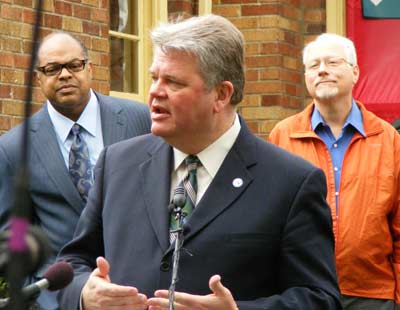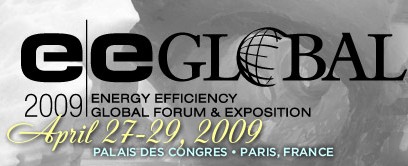The problem with conferences like this is that interesting tidbits — factoids and insights — come flying at you continuously. An Official Journalist is supposed to weave these tidbits into a narrative story, but in my experiences those stories tend to be fairly boring — the only reason to read them is to pull out the tidbits. So why waste time burying the tidbits in the first place?
That, at least, is my rationalization for offering you this unordered, chaotic list of interesting things I’ve heard so far here at EE Global:
• Jean-Pascal Tricoire, President & CEO of Schneider Electric, said that global electricity use is projected to double by 2030, which means there will be more investment in electricity in the next 20 years than there has been in all of prior history. If we are to have any hope, that doubling of electricity must be accompanied by a halving of energy intensity — thus the central role of efficiency.
• Tricoire: electricity must be safe, efficient, reliable, and green, and those requirements pull in contradictory directions. Increasing the challenge is the fact that very few people are being trained to address electricity in this comprehensive fashion.
• Tricoire’s reasons to hope: legislative requirements are being implemented in many countries; the U.S. and China are finally getting underway in earnest; and above all, the technology exists to do it — new materials and systems, new architectural designs, new means of energy storage, and new intelligent energy systems, both passive and active, that account for the full electricity lifecycle.
• Hon. Suresh Prabhu, Member of Parliament and Former Union Minister for Power, India: India will remain overwhelmingly reliant on fossil fuels through 2050. (He said this almost defiantly.)
• Dr. Johannes Milde, CEO of Siemens Building Technologies Divisions, Industry Sector, offered the following two lists.
Drivers of energy efficiency:
- rising energy costs,
- need for security of supply,
- a variety of legislative initiatives, and
- aging infrastructure.
Restraints on energy efficiency:
- the user vs. investor dilemma (I didn’t quite catch what this meant),
- end-user commitment (most people can’t be bothered),
- main priority: lowest first cost (that is, up-front costs are still decisive),
- no life-cycle calculation (not only are up-front costs decisive, but people still don’t bother, or even understand how to, calculate full lifecycle costs).
• Milde also made a point about building technologies that several other speakers made in different contexts: one of the most important areas of R&D is making sure that systems are not just efficient in isolation, but that they operate together as an efficient whole. He said standards for communication among building systems are still lacking.
• Hon. Claude Turmes, Member of European Parliament from Luxembourg and very active, longtime campaigner for EU climate action: “climate change” is too abstract to drive political action — instead we need green industrial policy.
• Turmes: EU’s 20-20-20 plan — 20% more energy supply, 20% greater efficiency, and 20% CO2 reductions by 2020 — means that the use of coal and nuclear will decline by more than 50% in the EU. (At least I think that’s what he said — seems remarkable if true.)
• Turmes: big challenges to efficiency in EU: no financing in economic recovery (stimulus) bills; shortage of people trained in this stuff; and in terms of lobbying, supply dominates demand.
• Turmes’ to-do list for efficiency champions:
- Educate leaders, especially from the business world and politicians.
- Organize an efficiency lobby, which now is sorely lacking.
- Targets and standards, targets and standards, targets and standards.
- Right now focus is obsessively on technological innovation; need more focus on organizational innovation. Need more R&D in that area.
- Consult communication experts to figure out how to make efficiency communication more sexy. (Wind turbines = sexy. Efficient boilers, not so much.)
• Turmes: biofuels and electric cars don’t replace proper planning — we need to move from car ownership to car usership and better public transportation.
• Turmes: “low-carbon” is far too vague. It doesn’t prioritize; it allows the most muscular lobbies to dominate. Public planning must prioritize, and efficiency must come first.
• Turmes’ list of Big Changes We Need:
- Move to “resource intelligence” as new economic paradigm.
- Move focus more to long-term.
- Citizenship must mean Get Involved rather than Go Shopping.
UPDATE: For one of those long narrative accounts I mentioned earlier, covering the first plenary session, see the EE Global blog.



